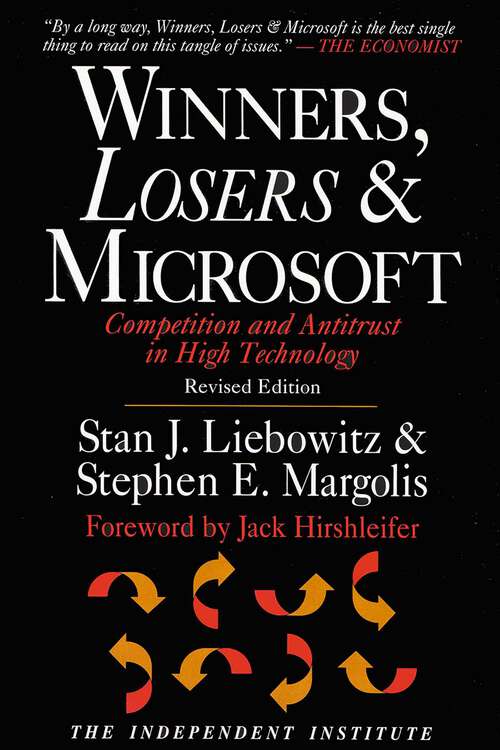Winners, Losers & Microsoft: Competition and Antitrust in High Technology
By: and
Sign Up Now!
Already a Member? Log In
You must be logged into Bookshare to access this title.
Learn about membership options,
or view our freely available titles.
- Synopsis
- Have the antitrust actions by the Department of Justice against Microsoft and other firms really intended to protect consumers, or are they politically motivated attempts to help competitors achieve what they could not achieve in the marketplace?Can dominant companies in a market, such as Microsoft, "lock in" inferior technologies and thereby stifle innovation and would-be competitors? Do "network effects"—the fact that some products, such as telephones and fax machines, increase in value as more people use them—result in monopolies even if dominant companies do not seek to create monopolies? Do the current antitrust laws discourage entrepreneurship and innovation? Will the robust high tech competition and tremendous technological advances of recent years continue if government steps up its antitrust actions? Winners, Losers & Microsoft addresses such questions and sheds light on the real workings of the high tech markets. Through extensive research and insightful analysis, Professors Liebowitz and Margolis shatter many long-held beliefs about competition in the high technology industries. Among their surprising findings: Software prices fall dramatically in markets where Microsoft is a major player, but prices show no strong tendency to fall over time if Microsoft is not a factor in a given market. Claims that dominant but inferior technologies can &“lock out&” better competitive products are not supported by the data. This not only applies to software, but also to other technology markets (i.e. VHS vs. Beta video recorder battles). Superior products tend to dominate in high technology, even if inferior products are backed by lots of money. For example, Intuit&’s Quicken has dominated Microsoft Money for several years despite intensive efforts by Microsoft to promote Money. And AOL has significantly increased its market share in recent years even through Microsoft incorporated software for the Microsoft Network into its Windows operating system. Liebowitz and Margolis demonstrate how a high-tech company can go from a dominant market leader—as Lotus once was in spreadsheets—to an also-ran with astonishing speed. They show that free markets in high technology do a remarkable job of continually delivering better products at lower prices to consumers. Winners, Losers & Microsoft makes a compelling case that the real danger to American high technology leadership is a too powerful, too intrusive government which believes it knows consumer preferences and needs better than they do. This book is a cogent, tightly argued rebuttal to frequent calls for greater government intervention in the high technology markets.
- Copyright:
- 2001
Book Details
- Book Quality:
- Publisher Quality
- ISBN-13:
- 9781598132717
- Related ISBNs:
- 9780945999843
- Publisher:
- Independent Institute, The
- Date of Addition:
- 06/04/25
- Copyrighted By:
- The Independent Institute
- Adult content:
- No
- Language:
- English
- Has Image Descriptions:
- No
- Categories:
- History, Nonfiction, Computers and Internet, Business and Finance, Politics and Government
- Submitted By:
- Bookshare Staff
- Usage Restrictions:
- This is a copyrighted book.
- Foreword by:
- Jack Hirshleifer
Reviews
Other Books
- by Stan J. Liebowitz
- by Stephen E. Margolis
- in History
- in Nonfiction
- in Computers and Internet
- in Business and Finance
- in Politics and Government
